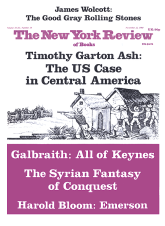In response to:
Revolution in the Church from the June 14, 1984 issue
To the Editors:
One of the more intriguing issues of modern Catholic theology is its strange wavering between an uncompromisingly critical attitude toward Scripture and an amazingly conservative understanding of such basic religious concepts as the nature of God and of His relation to the world. In his review of Eternal Life? [NYR, June 14] Thomas Sheehan summarizes Küng’s position on afterlife as the hope that Jesus is somehow with God. “If you follow the God of Judaism…you believe that in his loving omnipotence he will not let your life fray into nothingness. And if you believe that the same God gave Jesus eternal life, then you have a concrete pledge that your hope will be fulfilled.” But why should I follow “the God of Judaism” after his alleged revelation has been so thoroughly demythologized? Above all, what could the expression “the God of Judaism” possibly mean? The God of all, who has elected Israel to a special revelation? But such an “election” derives itself entirely from those Scriptures the untrustworthiness of which we have just learned. Furthermore, from minds so critical of Scripture we would expect at least as critical an analysis of such deeply anthropomorphic concepts as a God who “elects,” or a God who grants one group a “special revelation.” Why do they seek shelter from their own radical exegesis in a piously unexamined idea of God?
Even more striking than the “liberalism” of modern theology is its use of a double standard. Why do theologians suddenly relent their critical attitude when confronted with the primitive representations of God in late Judaism and early Christianity? The philosophical presuppositions of a text deserve as thorough a hermeneutic scrutiny as its social background and religious models! Time and again we find theologians after having accomplished a thorough demolition job on the credibility of Scriptures making piously confident statements about the plans, attitudes and even personal emotions of the particular God presented in those Scriptures. One would have expected an equally critical attitude toward the far more momentous assumptions about the nature of God than toward the historical details of the text. Why should we continue to accept those assumptions on “faith” after having rejected their sole and only basis in the name of reason? What foundation could an idea of God which virtually no philosopher still shares claim other than the fact that this is how the theologian goes on thinking, since he has found neither time nor taste to do for concepts what he has done for historical facts? One would never guess from reading their “critical” studies that there are more conceptually coherent religious alternatives such as panentheism or even pantheism.
The irony here is that many more systematic theologians are aware of these alternatives and freely adopt them. Yet their way of staying within some kind of orthodoxy is to take refuge from their radical concepts in a pious, rather literal reading of Scriptures. Thus I know some who do not hesitate to define God as “an inner power toward good” yet who function as priests and even participate in charismatic Christian movements. The same double standard, but in the opposite direction! Most amazingly, some theologians combine both. Thus Hans Küng in his book Does God Exist? competently and sympathetically discusses alternatives to the theism which he here uncritically embraces.
Critical thinking may be fun, particularly after centuries of imposed fideism. Yet it carries some responsibilities of its own—foremost among them, consistency. When a theologian decides to follow the path of radical criticism he thereby deprives himself of the right to accept unexamined concepts from “tradition” or, even more, from ideological fashion.
Louis Dupré
Department of Religious Studies
Yale University
New Haven, Connecticut
This Issue
November 22, 1984



